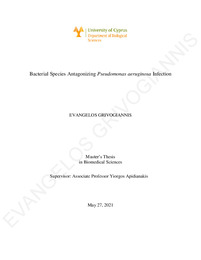Bacterial Species Antagonizing Pseudomonas aeruginosa Infection

Προβολή/
Ημερομηνία
2021-05-27Συγγραφέας
Grivogiannis, EvangelosΕκδότης
Πανεπιστήμιο Κύπρου, Σχολή Θετικών και Εφαρμοσμένων Επιστημών / University of Cyprus, Faculty of Pure and Applied SciencesPlace of publication
CyprusGoogle Scholar check
Keyword(s):
Metadata
Εμφάνιση πλήρους εγγραφήςΕπιτομή
Microbial species rarely exist in isolation in nature. Epithelial interfaces, such as the bilaterian intestine or the mammalian lung, harbour polymicrobial communities increasing infection complexity at these sites. We recently found that the Gram-negative bacterium Pseudomonas aeruginosa interacts antagonistically, additively, or neutrally with other Gram-negative bacterial species that colonize the human intestine, in the process of establishing a virulent infection in flies. More specifically, P. aeruginosa strain PA14 is inhibited upon interaction with Serratia marcescens, Klebsiella spp., Enterobacter aerogenes, Acinetobacter baumannii, Salmonella paratyphi, and Providentia spp. These 6 bacterial strains exert a strong antagonistic effect to P. aeruginosa extending Drosophila survival upon co-infection.
The main purpose of this follow-up study was to investigate whether the same antagonistic interactions occur in isolation in culture under both normal and hypoxic (5% Ο2) conditions mimicking the environment of the mammalian epithelia. In addition, all strains were tested in bacterial media containing or lacking glucose to also evaluate the impact of sugar fermentation on P. aeruginosa growth and pyocyanin production, a key virulence factor produced by this species.
Under normoxia, P. aeruginosa growth remained unaffected upon interaction in culture with any of the six bacterial strains in the absence of glucose. On the other hand, when glucose was added, Enterobacter aerogenes, Klebsiella spp., Acinetobacter baumannii and Providentia spp., inhibited P. aeruginosa growth and pyocyanin production. Under hypoxia, P. aeruginosa growth was compromised upon interaction with Lactobacillus plantarum, Bifidobacterium infantis and E. coli strain MGH only in the presence of glucose, while 3 more strains Enterobacter aerogenes, Klebsiella spp. and Acinetobacter baumannii, did not affect P. aeruginosa growth.
Co-infection of the hypoxic mouse lung with the E. coli strain MGH reduces virulence by the highly virulent P. aeruginosa strain B136-33. Moreover, Drosophila melanogaster under hypoxic (5% O2) conditions revealed that fly mortality can be significantly delayed upon co-infections of P. aeruginosa with Klebsiella spp., Enterobacter aerogenes, Acinetobacter baumannii, Salmonella paratyphi, or Providentia spp.
